- Home
- Anne Rivers Siddons
Off Season Page 2
Off Season Read online
Page 2
“She could do worse,” I heard my mother say once, tightly, in the days when I still eavesdropped.
“Not much,” I thought my father murmured from the rocker, but I was never sure of that.
And yet she was not all artifice. All the children from the cottages around us flocked to ours as naturally as thirsty birds to a birdbath. All the cottages down on this particular cove were members of the Middle Harbor Yacht Club, in the old Retreat Colony up the road, and had full privilege to join the brown, scabby-kneed colony children on the dock and in the tenders and small Beetle Cats in the harbor, or playing Ping-Pong in the raffish old clubhouse, or camping out on the islands in the bay across the harbor. And sometimes we did, but summer friendships are cemented early and tightly, and we came to be regarded as privileged outlanders, “too good for us,” hanging around only with each other at Liz Constable’s cottage. My mother really loved children, or, perhaps, I thought that summer, the children of others, and never seemed annoyed or bored with our endless and obscure yelping games, or the little flotilla of kayaks and Shellback dinghies that were tied up all summer beside my family’s old Friendship sloop at the end of our dock. We were the only cottage in our settlement that had a deepwater dock. All the others kept their boats at the yacht club.
Mother vanished for long periods during the day, into her studio or at the desk in her bedroom, writing letters or phoning on behalf of her causes. They were good New England liberal causes, my father often said: birth-control information for young girls, Martin Luther King, Jr., and his incendiary young civil rights battle, meals for the infirm and disenfranchised of Hancock County, cleaning up the effluent-fouled streams and bays nearby.
I know she was serious about these causes. I had seen her in tears over some social injustice or other featured on the flickery old black-and-white television in the cottage living room. And I know that there were people in the colony, women mainly, who found her indiscreet and vaguely threatening and her causes as unseemly in our little nineteenth-century fiefdom as a fart at the Chowder Race. I know too that she honestly did not care a finger flick what people thought of her activism or her painting. But she did care, secretly and profoundly, about maintaining her role as a careless natural beauty, a warm, funny woman far above artifice and agendas. I could never fathom the why of that as a child; complexity is largely beyond children.
But I still can’t today.
At noon Clara Anderson, who “did” for us mornings and who was the third generation of her family to do so for mine, would make a tray of bologna and cheese sandwiches and lemonade and put it on the big side screened porch, and we would rush in and wolf them down and be off again in a chattering swarm, out to the water or to the badminton and croquet courts my grandfather had carved out of the woods behind the cottage.
The other cottage mothers in our cove knew where to call if they had need of their children. So far as I knew, none of them ever worried that their offspring might be a bother to my mother, or that they might be in any way unsafe. Of course it was Clara who had the day-to-day burden of us, but she too liked children and had three of her own, and in our defense we had not yet absorbed any of the early-blooming horrors creeping into the cities then: drugs, alcohol, promiscuity, revolution. In Carter’s Cove, as our little settlement was called, all that came much later. The only really malicious thing I can remember us doing was setting off cherry bombs in the shabby small bathroom of the yacht club’s steward, a tight-faced fireplug-shaped young man from one of the original colony families who had not been accepted at Yale and was coldly mean-spirited to our crowd because we were not “his” kids. When our parents found out about it, we were forced to pick blueberries and wash windows and mow lawns to earn enough money for a new and vastly superior toilet. It struck us as only fair, and so we did not grouse too much about it, except that the steward got a far better toilet out of the deal and smirked at us all summer.
“Why were you so down on your mother that summer?” Cam asked me once. We had been together two months and were still in the stage where the necessity to know everything about each other, tell everything about ourselves, was paramount. On weekends, over coffee in one of the many small, dark cafés; at dinners of pizzas and cheeseburgers and an occasional salad; at night in the carapace of his old Porsche Carrera between kisses so profoundly consuming that they left us both sweating and gasping, we talked and we talked and we talked. Everything we said to each other was miraculous: the fact that he had been in the National Spelling Bee and lost by misspelling “mackerel” (I don’t eat it to this day). The fact that I had once dyed my hair green with food coloring before the Cornwell Country Day production of Peter Pan. (“Were you Wendy?” “No, I was the dog, Nana. A green sheepdog. I was a great hit.”)
So when he asked me about my mother and my feelings toward her that summer, I did not hesitate to spill out to him the thing I had never told anyone. Not my various best friends, certainly not Jeebs. Not my father, of course. No one.
“One day early that summer I went running up to her studio to ask her something,” I said. “I forget what. Whether we could go somewhere or other, I think. The stairs and the third-floor hall were covered in sisal matting, and I was barefoot and was sure she couldn’t hear me. It was lunchtime. We were never around her at lunchtime.
“Anyway, I got to the door of her studio and it was closed, but it always was, so in my adopted mode as supersleuth I eased the door open and looked in. She was . . . she was standing in front of her easel, facing me, and she had her shirt unbuttoned to the waist and was holding it open, and old Brooks Burns was standing in front of her with his hands all over her breasts, crawling like old spiders. Every now and then he’d bend over and smack one of them, or suck at it. He was making a kind of whistling noise in his throat; I thought maybe he was dying. She was smiling at him. It was . . . a sweet smile. Tender, like she’d give a child. After a while she said something to him and kissed him on the cheek, still smiling, and buttoned up her blouse and turned back to her easel and picked up her brush. He stood there awhile, gasping like a gaffed fish, and started to turn and leave. I was out of there and down the steps before I could get a deep breath. Then I went into the bathroom and threw up, and stayed in my bed under the covers all that day. I couldn’t let anyone in, not Clara, not my father, not my summer best friend, Cecie Wentworth.
“After dinner, my mother came in with a tray of toast and milk and started to sit down beside me and—I don’t know—feel my forehead or feed me or something. I said, ‘No,’ and turned over facing the wall. In a minute I heard her set the tray down and go out of my room and shut the door.”
Cam was silent for a while, tracing the line of my jaw with his fingertip. Then he said, “You never cut her much slack, did you?”
“Slack? My God! That old . . . satyr! You should have seen it.”
“Did it ever occur to you that she might have been doing him an exceedingly kind thing?”
“Not once,” I said, knowing the truth of what he said. Tears burned in my eyes. “Never once.”
The memory of that day stuck like a burr in my brain. I tried to dislodge it; I was not prepared to give up my grand and secret anomie. But I could feel it begin to trickle away like sand out of a sieve.
“Well,” Cam said, “I know if I was old and you showed me your beautiful boobs it would be an act of spectacular kindness.”
“That’s different.”
“Why is it?”
I did not answer, and presently he said, “Was she like that? I mean when you were back home, in school and all that?”
I remember that I stared at him for a long moment. It was something that had never occurred to me. “No,” I said slowly, thinking back to the winters in Washington that followed those summers. “No, she wasn’t. She was different at Edgewater. Come to think of it, we all were.”
“Why do you think that was?”
“It was just . . . simpler there. Nothing changed. In our colony, in all t
hose old colonies, not much had changed since the first people came there. Nothing much was new. If somebody painted a veranda or built a porch or bought a new piece of furniture, no matter how broken-down the old one was, people talked about it for weeks. New people hardly ever came in, except to visit. We ate the same things at the same time that our parents and grandparents had, or so my father said, and the grown-ups went to the same porches for cocktails and the club had the same regattas with the same boats every year, and it seemed to me that we even wore the same things every summer that I could remember, things we’d left at Edgewater. And we played the same games, children’s games that we wouldn’t have been caught dead playing at home. It was like all of us slipped back into some kind of idyllic summer time warp; it was like time stopped. I wonder why I never thought about that before. It was a whole other life and nobody seemed to know or question it.”
“So what do you think was responsible for all that? It sounds like Brigadoon.”
“The ocean,” I said suddenly, as sure of that as I had ever been of anything in my life. “The bay. The water.”
He laughed. “You sound like a sea nymph or a kelpie. Couldn’t it have been that you were all the same people you were all year, and the place, and the water, and all the old associates just called out different parts of you? Parts that just weren’t . . . winter parts? People don’t have two different selves, Lil. There are countless sides to all of us.”
“No. We were different people there. I’m sure of that.”
I was obscurely annoyed at him. He was undoubtedly right; Cam was always, among a thousand other things, my voice of pure reason. But I knew what I knew. I was different at Edgewater; I had always been different there. Back in Washington I was very much a child of my time; that sweet, smug, late fifties and early sixties world shaped me like potter’s clay. I was touched by most of it. But in those Maine summers I was a creature of water and wind and tides and rock, a much simpler being, awkwardly pure and without artifice except for that last summer, when I became a spy, and there was something essentially artless even about that. Cam was wrong. The sea changed me. I remember that I began to feel the sea recede as soon as we pulled out of the gravel driveway at Edgewater. By the time we crossed the Piscataqua River into New Hampshire, the breath of the bay was as faint as that of a dying child. By the time we reached Washington, D.C., it was gone, though its cadence whispered to me for months, a ghost without enough strength to do a proper haunting. In the first few humid, swaddling days before my classes at the National Cathedral School for Girls began, I was like a timid, newly caged wild thing: scarcely remembering but feeling in every cell the world I had lost, sniffing and tasting the somehow familiar cage into which I had been put, creature of neither, creature of both. My mother never failed to say that I was impossible in those few days; a changeling. My father simply touched my tangled curls and said, “It’s not easy when you first come back, is it? But in a few days you’ll be right at home at Cathedral, and then before you know it it’ll be time to go back to Maine again.”
I was nine or ten when I realized that it must be hard for him, too, newly returned to the most urban fortress of George Washington University, where he taught Chaucer, Shakespeare, and the Lake Poets to juniors and seniors who had not had the grades or the wherewithal to attend one of the Ivies. George Washington has a lustrous academic name now, but it was not always so. I am certain that my father never minded that. He was essentially a content man, perhaps a happy one. He was easy in his skin and confident in his calling, and a born family man. I have seen him angry, but never at us, though he must have been sometimes. His blue eyes often narrowed at injustice, unfairness, cruelty. But I have also seen them fill with tears as he looked at us around the dinner table or together in the sun at Edgewater. I think he was a very good man. I wish I had inherited more of that, instead of his wide mouth and light, straight stature.
I think my mother minded about his academic station and his ambition, or lack of it, though. The winter before that summer had changed everything. My mother’s best friend, Tatty Glover, had come for tea, bringing her daughter Charlotte to play with me. She was slightly older than I, and I thought her timorous, whiny, and a sissy. I can see that I must have intimidated her. I was impulsive, clamorous, a taker of risks and scorner of softness. I shudder to think now what those obligatory play sessions at our house must have cost her.
It was raining and I was bored with the pretty pink, green, and white bower that was my bedroom. Charlotte did not know how to play board games; she was afraid to climb on the gym set my parents had set up in the cavernous, white-painted basement for Jeebs and me. Jeebs had never paid it the least smattering of attention, being gone into the concerti and fugues of numbers inside his head by the time he was eight or nine. That left it to me—and to my father. He was delighted with it, and spent as much time as possible with me on the bars and swings. He was small, slender, firmly muscled in shoulders and arms and legs; indeed, he had the build of a gymnast. My mother was surprisingly amicable about our basement sessions on the gym set. She would only say, smiling, that she hoped all had gone well with the Flying Wallendas that day. Most of the summers of my childhood, when my mother and I and Jeebs were at Edgewater and my father’s duties kept him in Washington, I wondered if, there alone in the big house on Kalorama Circle, my father swung and leaped and thumped and laughed in the silent white Olympic ring of his basement.
So it was that day, petulant and disgusted with the shrinking Charlotte, that I said, “Okay, then, you think of something. What do you like to do at home? Comb your dolls’ hair?”
It was a nasty thing to say to a child I had already intimidated, and I knew it. I was half prepared for tears. Charlotte had employed them more than once to be allowed to go home early from our house. Instead, she looked at me out of brown eyes that could only be described as sly.
“Let’s go listen to our mothers. Hide and listen. I do that all the time. It’s fun!”
I stared at her for a moment as if she had lost her wits. Who cared what grown-up women said over tea in a Washington drawing room? On the other hand, there were thirty more minutes left of our enforced confinement. I followed her sulkily downstairs.
Our drawing room—my mother always called it that—opened off a large, high-ceilinged central hall, the focal point of which was a beautiful, curved mahogany staircase that rose three stories to the top of the house. Jeebs and I had worn out the patina on the railings, sliding down them until my mother or Lucille caught us. The drawing room was divided from the hall by heavy velvet drapes that were fastened back on either side with golden ropes and rosette holders. The flowing folds made a perfect hiding place, as secret and secure as a duck blind in a swamp. We crept into the velvet shelter, crouched down, and settled ourselves to listen.
At first the mumbled conversation was boring in the extreme; I could not make out the words themselves. I started to fidget, and Charlotte shushed me, and then I heard. It was Tatty Glover talking.
“What on earth more do you need, Liz?” she said, her voice smooth and oily and laced with humor that wasn’t really humor. I did not like Tatty then any more than I did her daughter, although I could not have said why. My affection for her came much later. “I mean, you’ve got this fabulous big old house on one of the best streets in Washington, and the summer house in Maine, and the Chevy Chase Club, and the Sulgrave Club, and George has the Metropolitan Club, and a distinguished career as a professor—your children, well look at them. Jeebs is an Einstein already and number one in his class at Saint Albans, and Lilly is at Cathedral and is going to be a pretty thing. I can name thirty of our friends who are green with envy of you. What else is missing?”
Over the chink of china I heard my mother’s low voice. “It’s just that it was all here, Tatty,” she said. “There’s not a piece of it that’s ours; we didn’t choose any of it. It came lock, stock, and barrel from George’s parents and grandparents. The only things we’ve paid for a
re the cars and the children’s educations, and if you think that’s easy on a college professor’s salary, especially George’s, well, think again.”
“You’re not saying you’re poor,” Tatty said. “I can’t believe I’m hearing this. Everybody knows how . . . well off the old judge was.”
My mother snorted. “Well,” she said, “Mother Emily made short order of all that when the judge died. Every bit of it went to Susannah and Gregory and the damned Colonial Dames. I guess she figured George would be president of the university sooner or later, so the houses and the clubs and all that would do us.”
“And they haven’t?”
“Oh, of course they have. I don’t mean to sound bitter or greedy. There’s just nothing of . . . me in this house. When I look in the mirror I always expect I’ll see old Emily Constable smirking at me under her blue wig.”
“Well, hang some of your paintings. Or sell some. Get a job. Take in sewing. God, Liz. I’d swap my life for yours any day.”
“You know not what you say, Tatty,” my mother said. “Enough of this. I’ll shut up. It’s just that we were at dinner at the club last night and Jackie walked in with her sister and that movie star, the Lawford one, I think, and it was like someone set off roman candles. The energy, the pure style, the sense of joie de vivre—it made me want to come home and burn the drapes and the antimacassars. I want to be part of that. I want to know those people.”
“You will, eventually, what with your good works and all,” Tatty said. “You and George will be dining at the White House and never play bridge with any of us again. Look, I’ve got to run. See you Thursday?”
“Yes,” Mother murmured, her voice subdued. “Look, don’t go telling anybody I’m whining about being poor. I’m just antsy, and it’s February and George has some excruciating faculty dinner I’ve got to go to tonight, and I hate Earl Grey and Lucille knows it, and I’ve got cramps . . .”

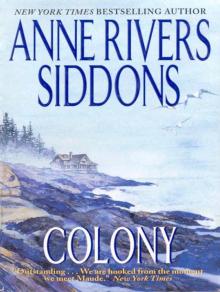 Colony
Colony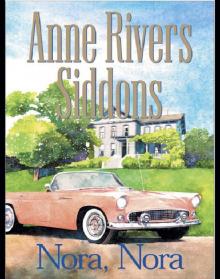 Nora, Nora
Nora, Nora House Next Door
House Next Door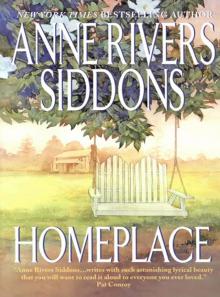 Homeplace
Homeplace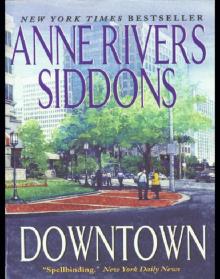 Downtown
Downtown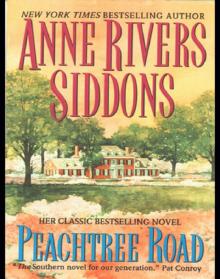 Peachtree Road
Peachtree Road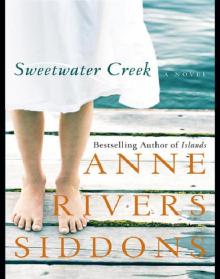 Sweetwater Creek
Sweetwater Creek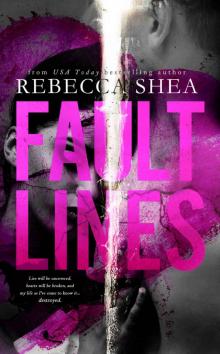 Fault Lines
Fault Lines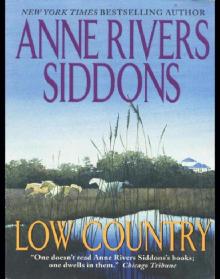 Low Country
Low Country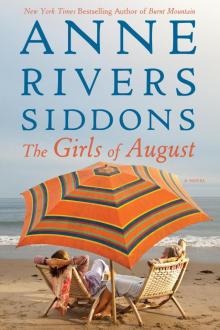 The Girls of August
The Girls of August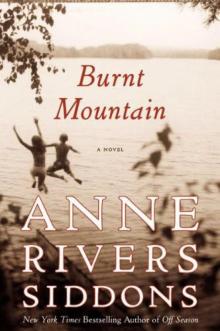 Burnt Mountain
Burnt Mountain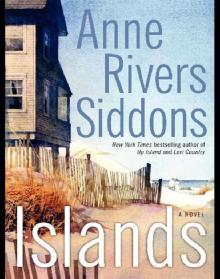 Islands
Islands